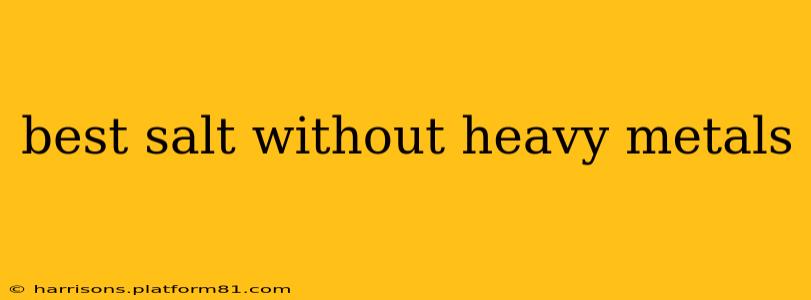Salt. A kitchen staple, a culinary essential, a crucial element in countless recipes. But the quality of salt can vary dramatically, and increasingly, consumers are concerned about heavy metal contamination. This guide will explore the best types of salt to minimize your heavy metal intake, addressing common questions and concerns.
What are Heavy Metals in Salt?
Heavy metals, such as lead, mercury, cadmium, and arsenic, are naturally occurring elements that can contaminate salt during the mining and processing stages. While small amounts of these metals are generally not harmful, consistent consumption of salt with elevated levels can pose health risks over time. These risks vary depending on the specific metal and the level of exposure.
How Can I Tell if My Salt Contains Heavy Metals?
Unfortunately, you can't visually determine the presence of heavy metals in salt. Many brands don't routinely test for these contaminants, and even if they do, this information isn't always readily available to consumers. To ensure you're purchasing salt with low heavy metal content, look for certifications and brands with rigorous testing procedures, which we'll discuss later.
What Types of Salt Are Less Likely to Contain Heavy Metals?
Several factors influence the potential for heavy metal contamination in salt. Here's a breakdown:
1. Sea Salt vs. Table Salt:
The source of the salt significantly impacts heavy metal content. Sea salt, harvested directly from the ocean, can contain higher levels of heavy metals depending on the location and water quality. Table salt, often mined from underground deposits, can also contain heavy metals, though the processing often removes some contaminants. Neither is inherently "better" – the key is choosing brands that prioritize purification and testing.
2. Unrefined vs. Refined Salt:
Unrefined sea salts, while often prized for their mineral content, may contain higher levels of naturally occurring heavy metals than refined salt. The refining process helps remove many impurities, including some heavy metals. However, over-processing can also strip essential minerals. A balance is key.
3. Location of Origin:
The geographical location where the salt is harvested or mined greatly affects its heavy metal content. Areas with known industrial pollution are more prone to contamination. Look for brands that clearly state their salt's origin and employ rigorous testing protocols.
Which Brands Have Good Track Records for Purity?
Several salt brands are known for prioritizing purity and testing their products for heavy metals. However, remember that regulations and testing methods vary. It's best to research specific brands and look for certifications or statements regarding heavy metal content.
How Can I Minimize My Heavy Metal Intake from Salt?
Even with the purest salt, moderation is key. High sodium intake is linked to several health problems, regardless of heavy metal content. Here are some tips to minimize your risk:
- Choose wisely: Opt for brands known for rigorous quality control and transparency regarding heavy metal testing.
- Vary your seasonings: Explore other flavor enhancers like herbs, spices, and citrus to reduce reliance on salt.
- Read labels carefully: Pay close attention to the ingredients list and any information provided about heavy metal testing or certifications.
- Consult a doctor: If you have specific concerns about heavy metal exposure or underlying health conditions, consult a healthcare professional.
Frequently Asked Questions:
What is the safest type of salt?
There isn't one universally "safest" type of salt. The level of heavy metals depends on the source, processing, and the brand's testing procedures. Focusing on brands with rigorous testing and transparency is more important than focusing on a specific type.
Does Himalayan pink salt have less heavy metals?
Himalayan pink salt is often marketed as pure, but it's not inherently free of heavy metals. The level of contamination can vary, so again, look for independent testing results from reputable sources before concluding it's definitively safer.
How much salt is too much?
The recommended daily sodium intake varies depending on individual health needs and factors. Consult dietary guidelines or a healthcare professional for personalized recommendations.
This guide provides helpful information but is not a substitute for professional medical advice. Always consult with a healthcare professional for concerns about heavy metal exposure or dietary requirements. Remember that mindful choices, combined with diverse seasoning options, are key to enjoying flavorful food while managing your salt intake responsibly.
